Navi Pillay explains ‘human rights’ limitations in Geneva on Tamil genocide
[TamilNet, Sunday, 21 March 2021
The manifestation of a “pre-existing strategy” using archaeology and historic preservation as guises for political or religious agendas has been observed by the UN Special Rapporteurs visiting Sri Lanka in recent years. Today’s international law has not provided universal human right to land. However, SL State’s violations of the land rights of “marginalised communities” could be addressed under the normative framework of international law, said Dr Navanetham Pillay. She mentioned the violation of the Right of Self-Determination. Pillay appeared as a keynote speaker at a conference titled “Loss of the Tamil Homeland,” which was convened by Justice C.V. Wigneswaran on Saturday. She was confronting TamilNet’s questions over her failure to call for investigations on Tamil genocide, which includes examining the “pre-existing strategy” for all the crimes committed against Tamils in the past.
“I hope someday that what happened in Sri Lanka and is still happening will be tested in a criminal jurisdiction — whether it is the International Criminal Court, a Hybrid Court or a Special Tribunal, which will hear the evidence to make that decision,” Dr Pillay said.
“I am not responsible — Of course, the OISL initiative was taken when I was still High Commissioner; That report came out after I retired,” she said.
Although the former High Commissioner for Human Rights was still in the mode of giving excuses for dodging to call for investigations on genocide in the run up to the OISL Investigation process, her responses were indirectly implying how the future demands of Tamils need be formulated and who should act to make the UN deliver them.
She mentioned Special Tribunal (ICT) in addition to the ICC along with Hybrid Courts as the courts where the crime of genocide could be determined. The journalists, civil society activists and possibly some State parties, are the ones who are not bound by the “human rights” limitations in passionately calling for genocide investigations before an actual criminal investigation takes place, according to her.
“[I]n the Human Rights Council, we are limited to addressing human rights issues. Very often, we identify — we say these human rights violations are so gross that they could amount to crimes against humanity. That will be the explanation why the OISL had a limited mandate on what they could do and not,” Dr Pillay said.
However, her explanation on this regard goes contrary to what the UN Fact-Finding Mission on Myanmar, established by her successor, proposed in 2018.
TamilNet’s introduction to the questions: When you visited the island in 2013 in the capacity of Human Rights High Commissioner, you went on record stating that no one you had met on the island used the word genocide to you. Furthermore, you were implying that there was no “clear case of genocide” by comparing the situation with Rwanda as you had the experience of being a judge in the ICTR and that you said it was a “clear case” for Rwanda of genocide. In the mainstream Tamil opinion, there is a “clear case of genocide” in Sri Lanka. All mainstream Tamil political actors since 1956 have made this claim for at least 65 years. The SL State has not only waged mass slaughter of Eelam Tamils, but it has also “deliberately inflicted on the group, conditions of life calculated to bring about its physical destruction in whole or in part”. The state-driven land grab in the North and East, which is being discussed today, is also a systematic project carried out with genocidal intent. There is a clear case of existing ideology and a provable grand plan of Sinhala militarisation and colonization in the island.
Question 1: Why did the OHCHR Investigation on Sri Lanka (OISL) avoid looking into the crime of genocide under your administration?
Dr Navanetham PillayDr Navanetham Pillay: “[O]nly a Court of law having heard all the evidence can decide whether genocide was committed. The crucial element of the crime of genocide is — the prosecution has to prove an intention to destroy from the policy, the plans and the actions. This is why human rights activists don’t use the word loosely; Lawyers and judges don’t either; Journalists do; And, of course, activists being passionate that their sufferings must be on the highest scale. Let me assure you that crimes against humanity are equally as serious as genocide. So, I hope someday that what happened in Sri Lanka and is still happening will be tested in a criminal jurisdiction — whether it is the International Criminal Court, a Hybrid Court or a Special Tribunal, which will hear the evidence to make that decision. I am not responsible — Of course, the OISL initiative was taken when I was still High Commissioner; That report came out after I retired. But, I could readily answer that question that in the Human Rights Council, we are limited to addressing human rights issues. Very often, we identify — we say these human rights violations are so gross that they could amount to crimes against humanity. That will be the explanation why the OISL had a limited mandate on what they could do and not. However, there is [inaudible]”.
Question 2: Do you feel that time has come for UN mechanisms to look into the allegation of genocide, and if so, what is the proper mechanism (UNHRC or UN General Assembly) where Tamils should take this forward?
Dr Navanetham Pillay: “The Human Rights Council has a limited mandate. It is a subsidiary body of the UN General Assembly, and its mandate is human rights. So, the Human Rights Council cannot refer a matter to the International Criminal Court. The only body that can do so is the Security Council. They have already done so in respect of Darfur in Sudan and Libya. So this precedent, where there is enough cause and pressure particularly from civil society and from states that support you on your call for justice – if you can get that level of support— then Security Council is the only alternative [inaudible].”
Question 3: If you are still not convinced that there is a “clear case of genocide” of Tamils in Sri Lanka, what are the grounds that makes you believe so? (Your 2013 comment: https://www.youtube.com/watch?v=a3ZX57GnYdg)
Dr Navanetham Pillay: “Only a court can make that decision after hearing all the evidence. I have no position on this. I hear people, and I follow some of the evidence. But, it is only a Court that can determine whether there has been a genocide or not.”
* * *
Questions raised to Dr Pillay at the conference were not intended to seek her clarification on where the crime of genocide gets finally determined, but why the OHCHR Investigation on Sri Lanka failed to call for such a subsequent judicial investigation.
Apart from interpreting Dr Pillay’s explanations that she was “not responsible” for the findings of the OHCHR Investigation on Sri Lanka (OISL), the UNHRC’s role being limited to the “human rights” alone and that the UN findings on crimes against humanity being equally as powerful as the crime of genocide, Eelam Tamils need to grasp the fact it was the lack of will from the entire UN Human Rights mechanism, under her command as well as her predecessor and the successors, that failed to address the root crime in the situation of Tamils.
The US administration under President Obama was primarily responsible for limiting the situation’s scope under Agenda Item 2. Obama is also trying to evade his administration’s responsibility in 2009 and in 2015 passing the blame over to the UN and all other Member States.
In his 2020 memoir ‘A Promised Land’, Obama wrote: “[E]ven after the Cold War, divisions within the Security Council continued to hamstring the U.N.’s ability to tackle problems. Its member states lacked either the means or the collective will to reconstruct failing states like Somalia, or prevent ethnic slaughter in places like Sri Lanka.”
To realise the illogical replies, responses and explanations in the failure of UNHRC/OHCHR addressing the root crime in Sri Lanka, one has to only look at the reports of the “UN Fact-Finding Mission on Myanmar” established by the UN Human Rights Council in March 2017, under Agenda Item 4.
The UNHRC/OHCHR didn’t have any such theoretical “limitations” of its subsidiary role in the case of Myanmar. The UN Fact-Finding Mission on Myanmar, in its reports, concluded that the military of Myanmar “should be investigated and prosecuted in an international criminal tribunal for genocide, crimes against humanity and war crimes”.
For example, the 2018 September report (A/HRC/39/64) on Myanmar stated: “The critical element of the crime is ‘genocidal intent’. The mission assessed its body of information in the light of the jurisprudence of international tribunals regarding the reasonable inference of such intent. The crimes in Rakhine State, and the manner in which they were perpetrated, are similar in nature, gravity and scope to those that have allowed genocidal intent to be established in other contexts. Factors pointing to such intent include the broader oppressive context and hate rhetoric; specific utterances of commanders and direct perpetrators; exclusionary policies, including to alter the demographic composition of Rakhine State; the level of organization indicating a plan for destruction; and the extreme scale and brutality of the violence committed.”
The report also noted the following: “In the light of the above considerations on the inference of genocidal intent, the mission concludes that there is sufficient information to warrant the investigation and prosecution of senior officials in the Tatmadaw chain of command, so that a competent court can determine their liability for genocide in relation to the situation in Rakhine State.”
Obviously, the OHCHR Investigation on Sri Lanka was sophisticatedly managed not to look into the crime of genocide, even at the level of “reasonable grounds to believe,” the standard of proof it was using.
The UN Fact-Finding Mission on Myanmar was also using the same standard of proof. But, it was able to call for investigations on genocide before mentioning the crimes against humanity and war crimes in the correct order.
Dr Pillay’s successor, Professor Zeid Ra’ad Al Hussein, went on record stating that his office “for the time being” didn’t perceive acts of genocide as having allegedly happened. “That is not to say that at a subsequent stage, once investigations were conducted that is implausible,” he said in 2015 when presenting the OISL report in Geneva.
The question Tamils should ask in 2021 is when the UN Human Rights system is going to call for such an investigation on genocide.
There needs to be a paradigm-shift in the outlook of the UN Human Rights system and Tamils needs to wage a struggle to make it happen and the struggle needs to be targeting all those who were responsible for sweeping of the crime of crimes under the carpet.
It doesn’t matter whether that paradigm shift happens within the UNHRC, at the OHCHR or at a higher forum.
* * *
In the meantime, another question posed by an attendee focused on the issue that the International Community aided the Sri Lankan Government tremendously during the war. The same IC failed to convince the SL government towards genuine reconciliation after the end of the war. Dr Pillay replied: “Specific research must be done to expose that level of support of certain powerful countries in the world who manufacture weapons and so on [inaudible].”
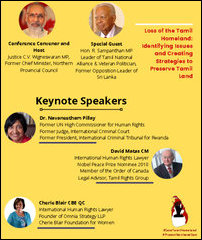
The online webinar, convened by Jaffna District TMTK Parliamentarian and former Northern Provincial Council Chief Minister Justice C.V. Wigneswaran, also saw the attendance of ITAK Parliamentarian and former Opposition Leader R. Sampanthan of the TNA as the special guest.
Regrettably, the TNPF/ACTC did not attend the conference despite the convener extending an invitation to make the event a joint effort with their participation. “We need to take the cue from Mr Sampanthan. For the greater benefit of the Tamil nation, he was prepared to join in when I asked him. We have had our differences on policy matters, and yet prepared to join when I asked him. In fact, I had asked other leaders too. But, they preferred to keep mum not responding to my two emails. Even when I took a call they didn’t answer,” Justice Wigneswaran said at the conference.
The topic of the online symposium was “Loss of the Tamil Homeland: Identifying issues and Creating Strategies to Preserve Tamil Land”.
David Matas CM, the senior legal counsel of B’nai Brith Canada attended the conference as the keynote speakers along with Dr Pillay. Cherie Blair CBE QC, a British barrister, lecturer and writer married to Tony Blair, who was the British Prime Minister when the genocidal onslaught was carried out against Eelam Tamils by the SL State, was also scheduled to address the conference, but couldn’t make it.
The conference also accommodated an array of Tamil and non-Tamil academics and younger generation activists in separate panels throughout the day.


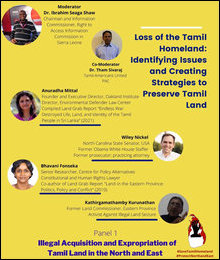
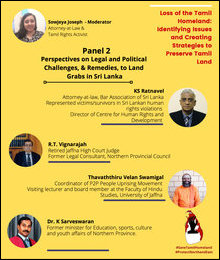
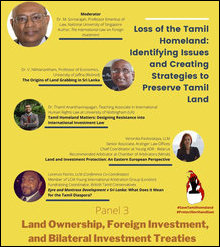
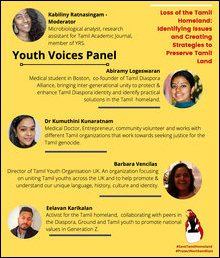
Related Articles:
15.03.21 Deceived Tamil activists in UK falsely claimed ‘substantial ..
09.03.21 UK repeatedly wronged Tamils says hunger-striker, demands ge..
26.02.21 Tamils witness false dilemma in Geneva as geopolitical forma..
07.02.21 Unprecedented P2P uprising paves the way for rights-oriented..
13.01.20 Putting Russian abetment of Tamil genocide in proper context
10.01.20 Sampanthan indirectly implicates India, US, EU, UK, Japan, N..
08.05.19 Blake’s Colombo lecture reminds Tamils of bureaucracy abetti..
22.03.19 UNHRC ‘Sri Lanka’ roadmap premeditated not to deliver genoci..
10.11.18 Obama,Clinton, Power accountable for protracted genocide hau..
27.06.17 Belated OHCHR ‘discovery’ of US-UK paradigm, eye opener to T..
28.08.15 Colombo spent 6.5 million USD to influence Washington in 201..
12.07.15 Srebrenica, Mu’l’livaaykkaal: genocide’s political dimension
02.10.13 Question raised on truth of Navi Pillay statement
27.09.13 Navi Pillay’s oral update, a gross betrayal of Tamils: Prof ..
25.09.13 Pillay ‘balances’ crimes of genocide with crimes of bad gove..
09.09.13 Navi Pillay, a big disappointment: Prof Ramasamy
22.02.13 Blake, architect of Tamil tragedy, spectator to genocide
09.11.12 U.S. reasserts immunity to Rajapakse from war crimes
26.09.12 US letter urges soft approach to Rajapakse rights violations
15.03.12 US resolution offers bailout to Rajapaksa: Brian Senewiratne
20.01.12 Tamil plaintiffs oppose US Government’s stand on Rajapakse i..
14.01.12 US “suggests” immunity to Rajapakse from suit
27.12.11 Tragedy of US policy on Sri Lanka’s war crimes
22.09.11 US cables show how international silence enabled Sri Lanka’s..
——————————————————————————————————————–
UN defends ‘silence on genocide’ in Sri Lanka war crimes report
COLOMBO:, SEPTEMBER 21, 2015 IS UPDATED: SEPTEMBER 02, 2016
The Office of the United Nations High Commissioner for Human Rights (OHCHR) has defended the findings of its report on alleged war crimes in Sri Lanka, which drew criticism from several quarters for its “silence” on genocide in the island nation.
Responding to a question sent by The Hindu in this regard, Ravina Shamdasani, spokesperson for the High Commissioner, stated via email: “This [the U.N. report] does not preclude such a finding [that genocide was committed] being made as a result of further criminal investigations, including by the hybrid court that we recommend.”
“The crime of genocide requires specific objective and subjective elements. On the basis of the information we were able to gather, we did not come to the conclusion that these elements were met,” she said.
In February, Sri Lanka’s Northern Provincial Council passed a resolution, blaming successive governments in the country of committing “genocide” against Tamils.
The spokesperson pointed out that given the circumstances in which the investigation was carried out, the OHCHR was able to conduct “a comprehensive investigation”, with over 3,000 written submissions, interviews in 11 countries, photos, videos, and satellite imagery with expert analysis.
However, criticising the report on different counts, including that of relying on the testimony of people whose identity has been kept confidential, former Foreign Minister of Sri Lanka, G.L. Peiris, argued that the “purported evidence, on which critical findings are based, is shrouded in secrecy”.
“There is, consequently, a breach of the requirements of fairness and transparency even at the basic level.”
He contended that Sri Lanka had every opportunity to use well-established principles of international humanitarian and human rights law, applied with “reasonable uniformity in precedents” across the globe, to make a cogent case for the protection of the military personnel. “Sadly, we seem to be treading instead a different path fraught with the greatest danger.”
Suffice to say Kumarathasan Rasingam is a lackey of the author of this article. He is an armchair critic at best and an imbecile at worst. He and his cohorts backed Gajendrakumar and Wigneswaran described by the author as leaders of “self-image boosting parties” by demonizing the TNA.
The result was Ankayan of the SLFP won a seat in Jaffna electoral district. Viyalendran contested and won a seat on the SLPP, Douglas Devananda won 2 seats including one National List MP, Pillayan who is the alleged murderer of Joseph Pararajasingham, TNA MP entered parliament. The upshot is both the author and KR are living in luxury overseas and inciting Tamil people to take to the streets, break the law, and get jailed under PTA. This is the tragedy of the Tamils
The greatest achievement of the TNA is the internationalization of the plight of Tamils. The full implementation of the 13A is now part and parcel of UNHRC Resolution 40/1 of March 23, 2021.
Responding to a question by Frontline reporter Ravina Shamdasani, spokesperson for the High Commissioner, stated via email: “This [the U.N. report] does not preclude such a finding [that genocide was committed] being made as a result of further criminal investigations, including by the hybrid court that we recommend.”
“The crime of genocide requires specific objective and subjective elements. On the basis of the information we were able to gather, we did not come to the conclusion that these elements were met,” she said. (https://www.thehindu.com/news/international/south-asia/un-defends-silence-on-genocide-in-sri-lanka-war-crimes-report/article7674861.ece)
It is hoped that the 12 member experts committee appointed by the High Commissioner Michelle Butched will investigate and gather evidence to prove that Sri Lanka did commit genocide during the war.
On the question of genocide, Dr. Navanetham Pillay said “Only a court can make that decision after hearing all the evidence. I have no position on this. I hear people, and I follow some of the evidence. But, it is only a Court that can determine whether there has been a genocide or not.” (https://www.tamilnet.com/art.html?catid=79&artid=39975)
Since the author has cited Thirukkural to back his tirade against TNA I take the liberty to quote another Kural which

Leave a Reply
You must be logged in to post a comment.